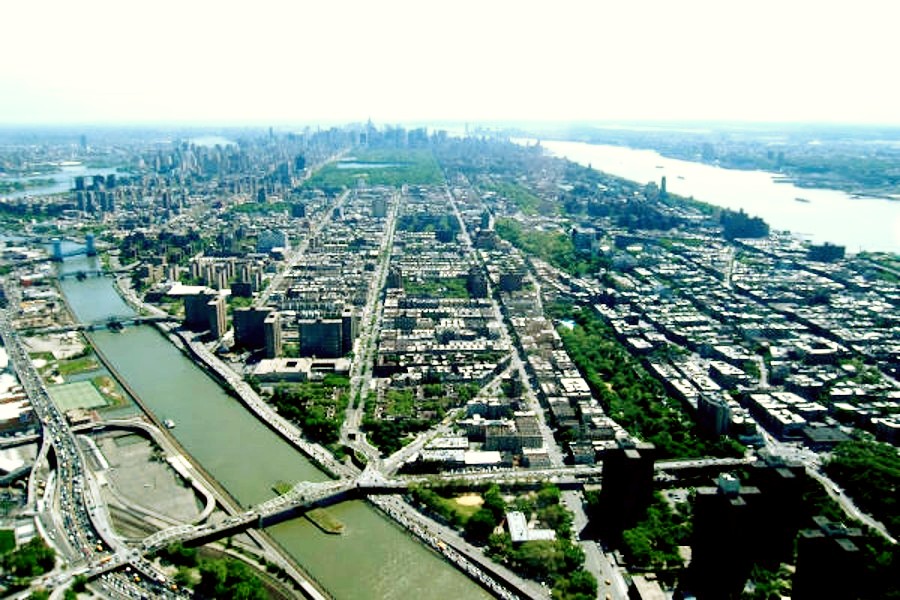
Because the climate crisis is disproportionately impacting communities of color, WEACT’s Climate Justice Working Group partnered with East Harlem COAD.
Also, they partnered with Harlem Emergency Network to develop a community-driven emergency preparedness plan for Northern Manhattan.
Extreme Heat
Because of climate change, New York City summers are getting hotter and the heat is lasting longer.
“…50 percent of the heat-related deaths in New York City are Black/African American people, even though they make up only 25% percent of the city’s population.”
50 percent of the heat-related deaths in New York City are Black/African American people, even though they make up only 25% percent of the city’s population. New York City may see an average temperature increase of 5.7°F, including a doubling of days above 90°F, by the 2050s according to the New York City Panel on Climate Change (NPCC). Parts of Northern Manhattan are particularly affected by this increase. This is not just because of the temperature increase, but because a high percentage of Northern Manhattan residents are low income, and at least a third live in homes with maintenance deficiencies or in poorly weatherized old homes, with issues such as leaks, cracks, or holes. These factors make it more difficult to avoid the heat and properly cool the home, and make it more difficult to access help and prepare for extreme heat. Individuals without social connections, older adults, and people with disabilities or chronic illnesses are more likely to spend a lot of time at home in the heat and are more susceptible to illness or death during a heatwave.
Flooding
In our new climate reality, flooding from hurricanes and extreme precipitation will become more frequent and will cause more damage than previously anticipated. Areas within New York City considered to fall in the 100-year floodplain could experience extreme weather in spans of 3-20 years, and areas that have been quartered off as a 500-year plan may experience extreme weather in 25-40 years. While FEMA coordinates with the New York City Department of Emergency Management to update flood risk maps, they struggle to keep up with rising sea levels and do not disseminate changing levels of risk to the community. Many residents of Northern Manhattan rely on outdated flood maps that misrepresent their current risk.
In WE ACT for Environmental Justice’s Northern Manhattan Climate Action Plan, emergency preparedness was a key pillar for planning the future of Northern Manhattan. After the devastating impact of Hurricane Ida that took the lives of 13 New Yorkers in September 2021, WE ACT’s Climate Justice Working Group members felt an urgent need to prioritize emergency preparedness to make sure that their family, friends, neighbors, and community are ready for more extreme weather exacerbated by climate change.
The Solution
In the effort to create a comprehensive community-driven emergency preparedness plan that focuses on climate-related disasters, WE ACT for Environmental Justice partnered with East Harlem COAD and Harlem Emergency Network to create the Climate Ready Uptown Plan (CRUP). CRUP is a physical pamphlet that helps Northern Manhattan community members understand their individual risk to climate-related disasters – specifically extreme heat, coastal and stormwater (pluvial) flooding – and provides pertinent information to help prepare themselves and their families. The plan is tailored to residents of Northern Manhattan, and includes an interactive map that helps residents better understand their flood risk. From the onset, CRUP was designed with the community at the forefront. WE ACT’s Climate Justice Working Group helped with the initial planning, research and layout of the tool, and scenario planning meetings as well as focus groups with Northern Manhattan residents helped WE ACT refine the messaging and language included in the plan to make it as effective and relatable as possible.
CRUP was one of ten national winners in the Environmental Protection Agency’s Let’s Talk About Heat Challenge, a national competition to identify innovative and effective communication strategies that inform people of the risks of extreme heat and offer ways to keep safe during the hottest days. With the additional funding, WE ACT’s Climate Justice Working Group plans to roll out community-led workshops to talk with groups in Northern Manhattan about emergency preparedness in relation to extreme heat and flooding, and show residents how to use the Climate Ready Uptown Plan.
WE ACT want to thank our partners at Urban Systems Lab for leading the design of the plan, and to Hester Street for providing the initial funding to create CRUP.
WE ACT
WE ACT’s mission is to build healthy communities by ensuring that people of color and/or low-income residents participate meaningfully in the creation of sound and fair environmental health and protection policies and practices.
You can download the plan in English (PDF) and Spanish (PDF), and learn more about why this is a climate justice issue and how we developed the plan below. You can also download our recommendations for an emergency kit in English (PDF) and Spanish (PDF).

- Ballet Hispánico’s Quinceañera Gala Raises Over $1.3 Million For Arts And Community
- FTC Investigating TikTok Over Data Privacy Protocols From Harlem To Hollywood
- Sponsored Love: Unveiling SEO Success, The Power Of Paid Guest Post Services On Fiverr
- Black Public Media Awards For Film And Immersive Media Projects
- Trust For Governors Island Announces The Fabulous ‘Year Of Milkweed’ Initiative
Become a Harlem Insider!
By submitting this form, you are consenting to receive marketing emails from: Harlem World Magazine, 2521 1/2 west 42nd street, Los Angeles, CA, 90008, https://www.harlemworldmagazine.com. You can revoke your consent to receive emails at any time by using the SafeUnsubscribe® link, found at the bottom of every email. Emails are serviced by Constant Contact








